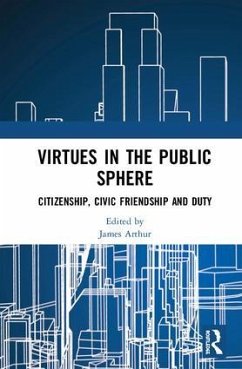Virtues in the Public Sphere
Citizenship, Civic Friendship and Duty
Herausgeber: Arthur, James
Virtues in the Public Sphere
Citizenship, Civic Friendship and Duty
Herausgeber: Arthur, James
- Gebundenes Buch
- Merkliste
- Auf die Merkliste
- Bewerten Bewerten
- Teilen
- Produkt teilen
- Produkterinnerung
- Produkterinnerung
Virtues in the Public Sphere features seventeen essays by experts from a variety of different perspectives on the broad theme of virtue in the public sphere.
Andere Kunden interessierten sich auch für
![Democratic Education and the Public Sphere Democratic Education and the Public Sphere]() Masamichi UenoDemocratic Education and the Public Sphere215,99 €
Masamichi UenoDemocratic Education and the Public Sphere215,99 €![Pedagogy, Democracy, and Feminism: Rethinking the Public Sphere Pedagogy, Democracy, and Feminism: Rethinking the Public Sphere]() Adriana HernandezPedagogy, Democracy, and Feminism: Rethinking the Public Sphere109,99 €
Adriana HernandezPedagogy, Democracy, and Feminism: Rethinking the Public Sphere109,99 €![Universities and the Public Sphere Universities and the Public Sphere]() Universities and the Public Sphere261,99 €
Universities and the Public Sphere261,99 €![The Education of the People: A Practical Treatise On the Means of Extending Its Sphere & Improving Its Character The Education of the People: A Practical Treatise On the Means of Extending Its Sphere & Improving Its Character]() J. WillmThe Education of the People: A Practical Treatise On the Means of Extending Its Sphere & Improving Its Character39,99 €
J. WillmThe Education of the People: A Practical Treatise On the Means of Extending Its Sphere & Improving Its Character39,99 €![A Christian Education in the Virtues A Christian Education in the Virtues]() James ArthurA Christian Education in the Virtues204,99 €
James ArthurA Christian Education in the Virtues204,99 €![The Six Virtues of the Educated Person The Six Virtues of the Educated Person]() Casey J. HurleyThe Six Virtues of the Educated Person133,99 €
Casey J. HurleyThe Six Virtues of the Educated Person133,99 €![Towards an Architecture for the Teaching of Virtues, Values and Ethics Towards an Architecture for the Teaching of Virtues, Values and Ethics]() Berise Therese HeaslyTowards an Architecture for the Teaching of Virtues, Values and Ethics80,20 €
Berise Therese HeaslyTowards an Architecture for the Teaching of Virtues, Values and Ethics80,20 €-
-
-
Virtues in the Public Sphere features seventeen essays by experts from a variety of different perspectives on the broad theme of virtue in the public sphere.
Hinweis: Dieser Artikel kann nur an eine deutsche Lieferadresse ausgeliefert werden.
Hinweis: Dieser Artikel kann nur an eine deutsche Lieferadresse ausgeliefert werden.
Produktdetails
- Produktdetails
- Verlag: Taylor & Francis Ltd (Sales)
- Seitenzahl: 276
- Erscheinungstermin: 27. November 2018
- Englisch
- Abmessung: 234mm x 156mm x 18mm
- Gewicht: 567g
- ISBN-13: 9781138585737
- ISBN-10: 1138585734
- Artikelnr.: 54745787
- Herstellerkennzeichnung
- Libri GmbH
- Europaallee 1
- 36244 Bad Hersfeld
- gpsr@libri.de
- Verlag: Taylor & Francis Ltd (Sales)
- Seitenzahl: 276
- Erscheinungstermin: 27. November 2018
- Englisch
- Abmessung: 234mm x 156mm x 18mm
- Gewicht: 567g
- ISBN-13: 9781138585737
- ISBN-10: 1138585734
- Artikelnr.: 54745787
- Herstellerkennzeichnung
- Libri GmbH
- Europaallee 1
- 36244 Bad Hersfeld
- gpsr@libri.de
James Arthur is Deputy Pro Vice Chancellor and Director of the Jubilee Centre for Character and Virtues at the University of Birmingham.
Contributors
Foreword: Lord James O'Shaughnessy
Introduction: James Arthur
Section 1 Virtues and Vices in the Public Sphere
Chapter 1: Virtue against sovereignty - John Milbank
Chapter 2: Reducing Arrogance in Public Debate - Alessandra Tanesini
Chapter 3: Moral Education, Skills of Civility, and Virtue in the Public
Sphere - Jonathan Jacobs
Chapter 4: Vice, Public Good, and Personal Misery - Jonny Robinson
Chapter 5: Patience, Temperance, and Politics - Kathryn Phillips
Section 2 Civic Friendship and Virtue
Chapter 6: Is There a Plausible Moral Psychology for Civic Friendship? -
Blaine J. Fowers
Chapter 7: Populism and the Fate of Civic Friendship - Randall Curren
Chapter 8: Education for Living Together in a Diverse UK: A Role for Civic
Friendship, Concord and Deliberation? - Andrew Peterson
Chapter 9: Resilience and Hope as a Democratic Civic Virtue - Nancy E. Snow
Chapter 10: Trust as a Public Virtue - Warren J. von Eschenbach
Chapter 11: Virtue, Education, and Political Leadership in Plato's Laws -
Mark Jonas
Chapter 12: Rethinking Self-interest and the Public Good - Mary Elliot and
Jeffery S. Dill
Chapter 13: Fostering Purpose as a Way of Cultivating Civic Friendship -
Kendall Cotton Bronk and Rachel Baumsteiger
Section 3 Perspectives on Virtue and the Public Sphere
Chapter 14: Responding to Discord: Why Public Reason is not Enough - John
Haldane
Chapter 15: Designing for Dialogue: Developing Virtue Through Public
Discourse - Harry H. Jones IV
Chapter 16: Virtù revisited - Edward Skidelsky
Chapter 17: Democratic change and 'the referendum effect' in the UK:
reasserting the good of political participation - Joseph Ward
Concluding Remarks: James Arthur
Foreword: Lord James O'Shaughnessy
Introduction: James Arthur
Section 1 Virtues and Vices in the Public Sphere
Chapter 1: Virtue against sovereignty - John Milbank
Chapter 2: Reducing Arrogance in Public Debate - Alessandra Tanesini
Chapter 3: Moral Education, Skills of Civility, and Virtue in the Public
Sphere - Jonathan Jacobs
Chapter 4: Vice, Public Good, and Personal Misery - Jonny Robinson
Chapter 5: Patience, Temperance, and Politics - Kathryn Phillips
Section 2 Civic Friendship and Virtue
Chapter 6: Is There a Plausible Moral Psychology for Civic Friendship? -
Blaine J. Fowers
Chapter 7: Populism and the Fate of Civic Friendship - Randall Curren
Chapter 8: Education for Living Together in a Diverse UK: A Role for Civic
Friendship, Concord and Deliberation? - Andrew Peterson
Chapter 9: Resilience and Hope as a Democratic Civic Virtue - Nancy E. Snow
Chapter 10: Trust as a Public Virtue - Warren J. von Eschenbach
Chapter 11: Virtue, Education, and Political Leadership in Plato's Laws -
Mark Jonas
Chapter 12: Rethinking Self-interest and the Public Good - Mary Elliot and
Jeffery S. Dill
Chapter 13: Fostering Purpose as a Way of Cultivating Civic Friendship -
Kendall Cotton Bronk and Rachel Baumsteiger
Section 3 Perspectives on Virtue and the Public Sphere
Chapter 14: Responding to Discord: Why Public Reason is not Enough - John
Haldane
Chapter 15: Designing for Dialogue: Developing Virtue Through Public
Discourse - Harry H. Jones IV
Chapter 16: Virtù revisited - Edward Skidelsky
Chapter 17: Democratic change and 'the referendum effect' in the UK:
reasserting the good of political participation - Joseph Ward
Concluding Remarks: James Arthur
Contributors
Foreword: Lord James O'Shaughnessy
Introduction: James Arthur
Section 1 Virtues and Vices in the Public Sphere
Chapter 1: Virtue against sovereignty - John Milbank
Chapter 2: Reducing Arrogance in Public Debate - Alessandra Tanesini
Chapter 3: Moral Education, Skills of Civility, and Virtue in the Public
Sphere - Jonathan Jacobs
Chapter 4: Vice, Public Good, and Personal Misery - Jonny Robinson
Chapter 5: Patience, Temperance, and Politics - Kathryn Phillips
Section 2 Civic Friendship and Virtue
Chapter 6: Is There a Plausible Moral Psychology for Civic Friendship? -
Blaine J. Fowers
Chapter 7: Populism and the Fate of Civic Friendship - Randall Curren
Chapter 8: Education for Living Together in a Diverse UK: A Role for Civic
Friendship, Concord and Deliberation? - Andrew Peterson
Chapter 9: Resilience and Hope as a Democratic Civic Virtue - Nancy E. Snow
Chapter 10: Trust as a Public Virtue - Warren J. von Eschenbach
Chapter 11: Virtue, Education, and Political Leadership in Plato's Laws -
Mark Jonas
Chapter 12: Rethinking Self-interest and the Public Good - Mary Elliot and
Jeffery S. Dill
Chapter 13: Fostering Purpose as a Way of Cultivating Civic Friendship -
Kendall Cotton Bronk and Rachel Baumsteiger
Section 3 Perspectives on Virtue and the Public Sphere
Chapter 14: Responding to Discord: Why Public Reason is not Enough - John
Haldane
Chapter 15: Designing for Dialogue: Developing Virtue Through Public
Discourse - Harry H. Jones IV
Chapter 16: Virtù revisited - Edward Skidelsky
Chapter 17: Democratic change and 'the referendum effect' in the UK:
reasserting the good of political participation - Joseph Ward
Concluding Remarks: James Arthur
Foreword: Lord James O'Shaughnessy
Introduction: James Arthur
Section 1 Virtues and Vices in the Public Sphere
Chapter 1: Virtue against sovereignty - John Milbank
Chapter 2: Reducing Arrogance in Public Debate - Alessandra Tanesini
Chapter 3: Moral Education, Skills of Civility, and Virtue in the Public
Sphere - Jonathan Jacobs
Chapter 4: Vice, Public Good, and Personal Misery - Jonny Robinson
Chapter 5: Patience, Temperance, and Politics - Kathryn Phillips
Section 2 Civic Friendship and Virtue
Chapter 6: Is There a Plausible Moral Psychology for Civic Friendship? -
Blaine J. Fowers
Chapter 7: Populism and the Fate of Civic Friendship - Randall Curren
Chapter 8: Education for Living Together in a Diverse UK: A Role for Civic
Friendship, Concord and Deliberation? - Andrew Peterson
Chapter 9: Resilience and Hope as a Democratic Civic Virtue - Nancy E. Snow
Chapter 10: Trust as a Public Virtue - Warren J. von Eschenbach
Chapter 11: Virtue, Education, and Political Leadership in Plato's Laws -
Mark Jonas
Chapter 12: Rethinking Self-interest and the Public Good - Mary Elliot and
Jeffery S. Dill
Chapter 13: Fostering Purpose as a Way of Cultivating Civic Friendship -
Kendall Cotton Bronk and Rachel Baumsteiger
Section 3 Perspectives on Virtue and the Public Sphere
Chapter 14: Responding to Discord: Why Public Reason is not Enough - John
Haldane
Chapter 15: Designing for Dialogue: Developing Virtue Through Public
Discourse - Harry H. Jones IV
Chapter 16: Virtù revisited - Edward Skidelsky
Chapter 17: Democratic change and 'the referendum effect' in the UK:
reasserting the good of political participation - Joseph Ward
Concluding Remarks: James Arthur








